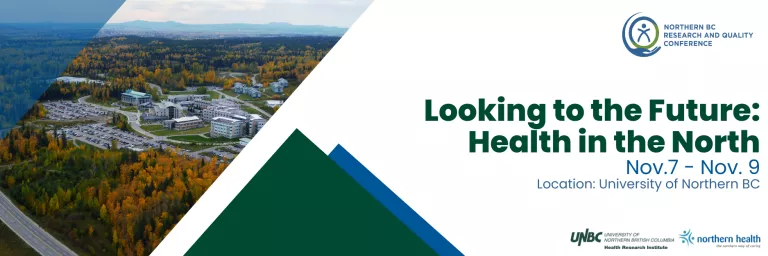
Concurrent Session C
Date: November 8
Time: 11:00am - 12:00pm
Location: University of Northern BC, 6-305 (19 people max)
Theme: Health & Environment
Crystal McLeod
Title: Access to Blood Donation in Rural and Remote Canada: A Media Discourse Analysis
Objective: To understand recent media representations of blood donation services in rural and remote Canada, identify associated discourses, and explore the position of these distinct communities.
Methods: A search for written articles on rural and/or remote blood donation services was conducted across all Canadian news media outlets published between July 2013 and July 2023. Articles were sought using Google News, Newspapers.com, and Canadian Newsstream search engines. Included articles were then independently analyzed by the first two authors for codes, narrative themes, and larger discourses.
Results: A total of 62 articles met inclusion criteria, with the majority being derived from the provinces of British Columbia (N=16) and Prince Edward Island (N=9). As a whole, blood donation services in rural and remote Canada have been reported as decreasing in access over the last decade. Specifically, Prince George saw the region’s only donation clinic close in 2015. Today, Northern Health’s closest donation clinic is over 600 km away; nor is the region serviced by portable donation clinics. Other relevant discourses included frustration among rural community members with Canadian Blood Services and notices of celebration for long-time blood donors originating from rural areas. Subject position was primarily that of rural and remote residents sharing their experiences.
Conclusion: To the authors’ knowledge, this analysis is the first study to report on the value and meaning of blood donation services within rural and remote Canada. Additional and ongoing study on the specific impact of loss of blood donation services within rural and remote communities may be of benefit.
Christiana Onabola
Title: A Situational Analysis of a Hydroelectric Dam’s Impacts on Health Equity and Mental Health through the Lens of the SDGs
Abstract: While the ecosystem impacts of the Kenney dam in the Nechako watershed have been extensively studied, only a few studies have considered some of the ways in which the dam’s situation may have posed threats to the mental health and well-being of individuals and communities in the Nechako. Although dams may not be causally linked to mental ill health, it is important to examine the pathways by which Kenny dam may have posed stress , trauma and influenced mental health outcomes and equity implications for affected communities and groups. Population-level health data to understand health and equity impacts remain limited at the local scales of the Nechako watershed. This study’s proposition is that the cross-sectoral grounding of the Sustainable Development Goals’ (SDG) integrative framework can be relevant as a health and equity lens to unmask equity nuances in the pathways of impacts of the Kenney dam on
ecosystems, communities, and mental health. Using a critical, grounded theory situational analysis, enmeshed with theoretical eco-health and political ecology perspectives, this case study was shaped using the Kenney dam in the Nechako watershed as a situation of inquiry and adopting three levels of qualitative enquiry into the socio-ecological contexts of the Kenney dam. The objectives are: (a.) to map the key contextual elements in the Kenney dam situation; (b.)to employ
a SDGs-informed equity lens to examine equity nuances and implications of the dam's impacts on ecosystems, communities, and health; (c.) to map pathways linking environmental systems to mental health equity based on the SDGs-lensed equity analysis in (b).
This research, in its contributions, is envisaged to be useful in shedding light on the obscure connections between dams and mental health and is relevant to help people who are making policy decisions to understand the potential impacts and future implications of their decisions. The findings could also provide useful knowledge resources for the public and health practitioners to advocate for a reframing of the legitimacy of hydroelectric dams. Moreover, the SDGs can support hydroelectric dam operations and policy development to address environmental health along with achieving the goals for electricity generation and energy development.
Sarah de Leeuw & Vivianne Josewski
Title: Moved by Northern First Nations Geographies: Land- and Place-Based Learning to Combat Anti-Colonial Bias in Medical Students
Aim: To offer insights into the transformative potential and methods of delivering - a unique relationship-based Indigenous-informed, experiential program aimed at disrupting colonial bias in medical education, known as the First Nations Communities Education Program (FNCEP).
Methods: The program, a partnership between First Nations Health Authority (FNHA), Northern Health Authority, and the Northern Medical Program in UNBC’s Faculty of Medicine, immerses medical undergraduate students in northern remote BC First Nations communities. Using humanity-informed methods, students provide arts-based, narrative reflections at pre-, mid- , and post-program to evaluate program impact and ensure ongoing quality improvement.
Person/Family/Community Partner Engagement: The FNCEP arose as a direct response to the FNHA’s request for more medical trainees to come into communities. Northern BC First Nations families and communities are engaged in delivering the program by hosting medical students in the context of the program.
Results: Every year since 2015, the program has supported between 7 and 15 undergraduate medical students being placed in remote northern BC First Nations communities. Using prose, poetry, photography, paintings, videos and even music, to date 79 medical learners have provided insight into how the FNCEP has transformed their understandings about health, wellness, resiliency, capacity and culture in northern First Nations. Analysis demonstrates enhanced cultural capacities, social accountabilities, perspective taking, empathy, and understandings of health determinants for northern, rural, and remote Indigenous Peoples and communities.
Conclusion: Over the last ten years, calls for anti-bias training in health care professionals have been growing and increasingly impacted directions of medical education in Canada. Our findings suggest that Indigenous land- and place-based ways of experiential teaching and learning combined with humanity-informed pedagogy that engages learners in critical and creative self-reflexivity offers a “refreshed approach” to anti-colonial bias training in medical education by educating both the “hearts and minds” of future physicians.